A Report on the Caregiving Experiences of Filipino Migrant Workers
VerifiedAdded on 2022/08/12
|6
|1653
|21
Report
AI Summary
This report provides a comprehensive analysis of the caregiving experiences of Filipino migrant workers, primarily focusing on the context of London, as explored in Deirdre McKay's "An Archipelago of Care: Filipino Migrants and Global Networks." The report examines the aims and main arguments of the book, highlighting the challenges faced by these workers, the concept of the 'migrant ethic of care,' and the role of global networks in their lives. It discusses key concepts such as 'affect' and 'shatter zones,' and the methodology employed by McKay, including interviews and participant observations. The report concludes by emphasizing the significance of McKay's work in understanding the increasing informalization of care work and the contributions of Filipino migrants within global care systems. The report also touches upon the multifaceted associations and correlations amongst these migrants along with their linkages from the United Kingdom, the Philippines as well as from other parts of the world.
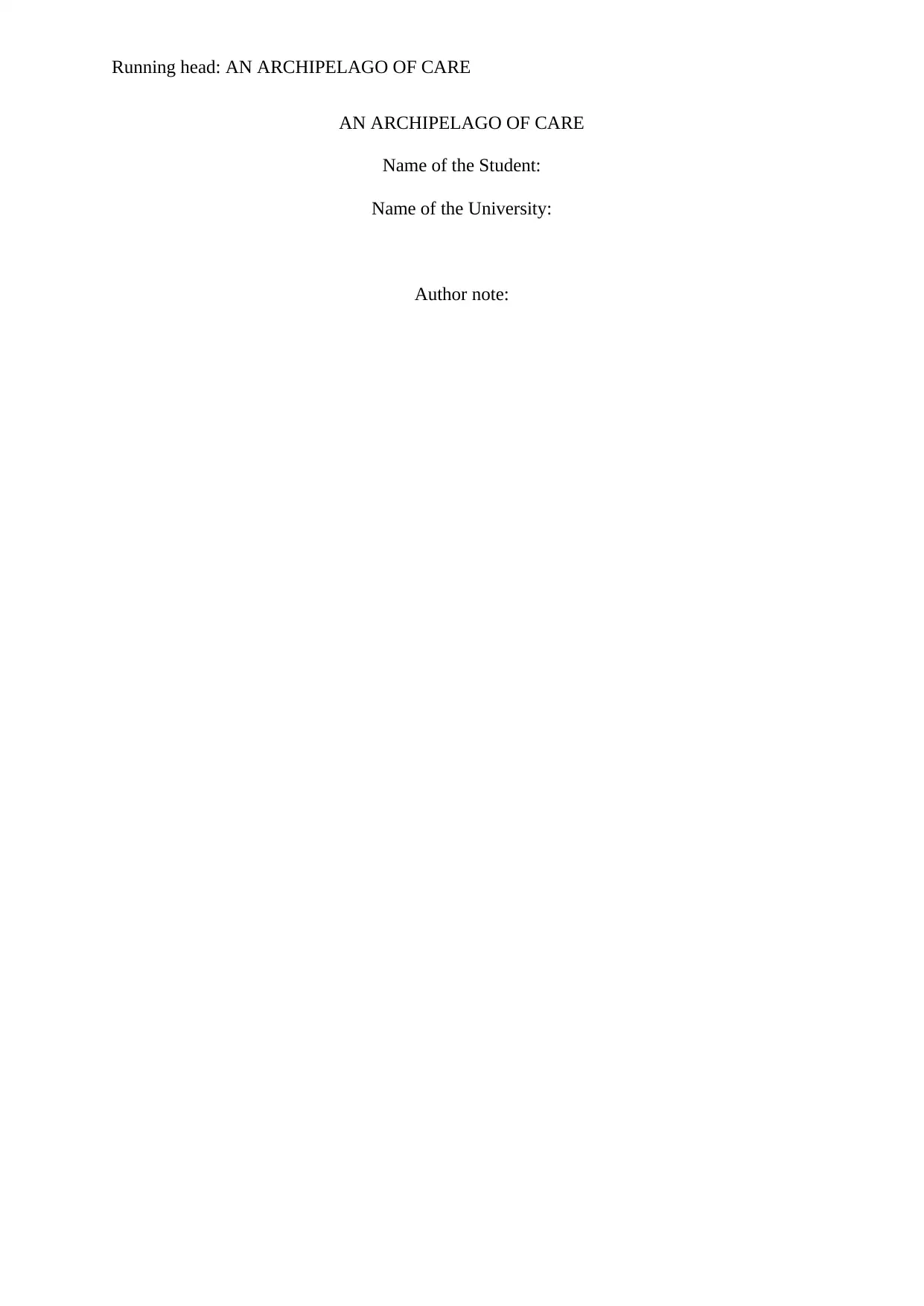
Running head: AN ARCHIPELAGO OF CARE
AN ARCHIPELAGO OF CARE
Name of the Student:
Name of the University:
Author note:
AN ARCHIPELAGO OF CARE
Name of the Student:
Name of the University:
Author note:
Paraphrase This Document
Need a fresh take? Get an instant paraphrase of this document with our AI Paraphraser
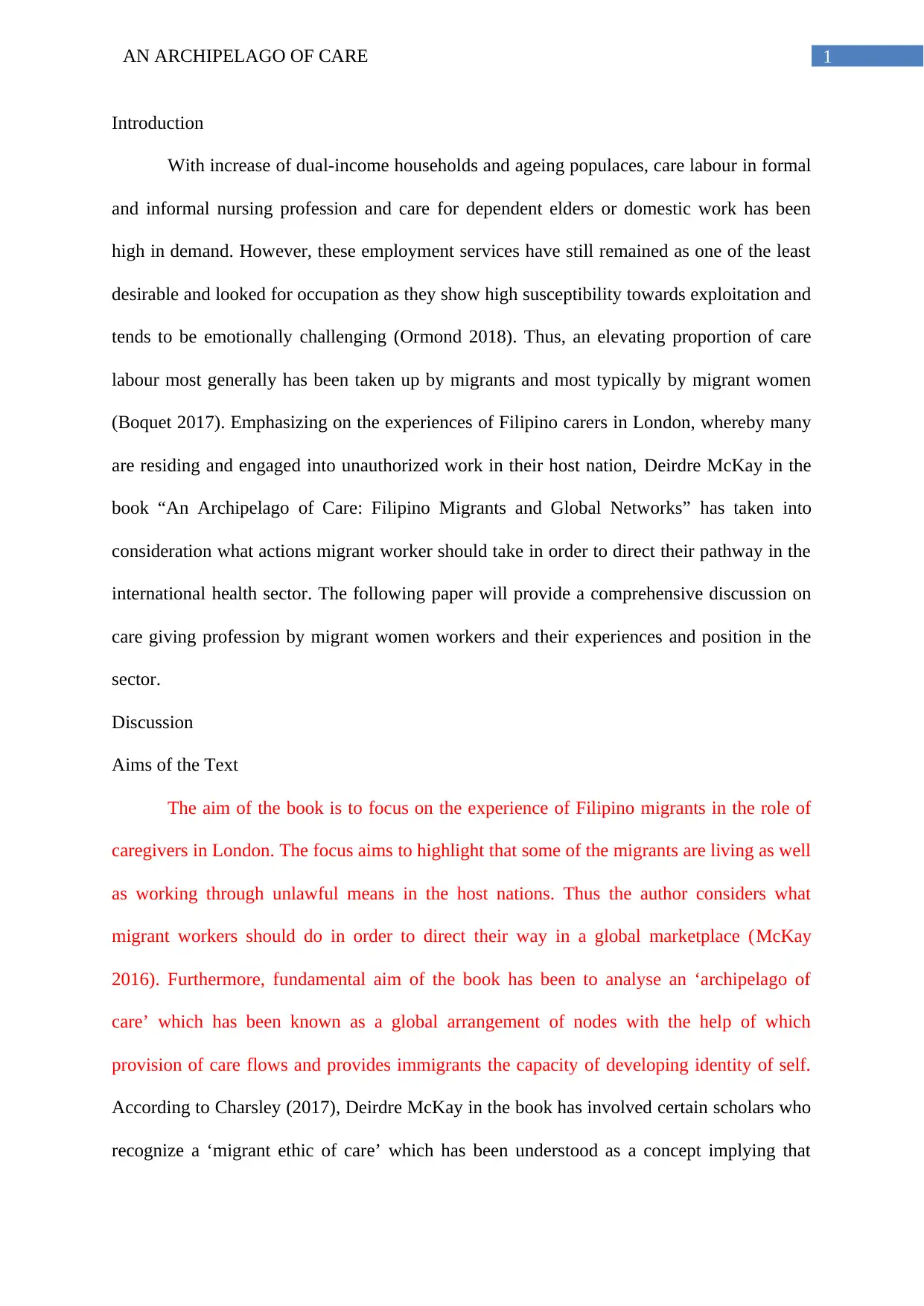
1AN ARCHIPELAGO OF CARE
Introduction
With increase of dual-income households and ageing populaces, care labour in formal
and informal nursing profession and care for dependent elders or domestic work has been
high in demand. However, these employment services have still remained as one of the least
desirable and looked for occupation as they show high susceptibility towards exploitation and
tends to be emotionally challenging (Ormond 2018). Thus, an elevating proportion of care
labour most generally has been taken up by migrants and most typically by migrant women
(Boquet 2017). Emphasizing on the experiences of Filipino carers in London, whereby many
are residing and engaged into unauthorized work in their host nation, Deirdre McKay in the
book “An Archipelago of Care: Filipino Migrants and Global Networks” has taken into
consideration what actions migrant worker should take in order to direct their pathway in the
international health sector. The following paper will provide a comprehensive discussion on
care giving profession by migrant women workers and their experiences and position in the
sector.
Discussion
Aims of the Text
The aim of the book is to focus on the experience of Filipino migrants in the role of
caregivers in London. The focus aims to highlight that some of the migrants are living as well
as working through unlawful means in the host nations. Thus the author considers what
migrant workers should do in order to direct their way in a global marketplace (McKay
2016). Furthermore, fundamental aim of the book has been to analyse an ‘archipelago of
care’ which has been known as a global arrangement of nodes with the help of which
provision of care flows and provides immigrants the capacity of developing identity of self.
According to Charsley (2017), Deirdre McKay in the book has involved certain scholars who
recognize a ‘migrant ethic of care’ which has been understood as a concept implying that
Introduction
With increase of dual-income households and ageing populaces, care labour in formal
and informal nursing profession and care for dependent elders or domestic work has been
high in demand. However, these employment services have still remained as one of the least
desirable and looked for occupation as they show high susceptibility towards exploitation and
tends to be emotionally challenging (Ormond 2018). Thus, an elevating proportion of care
labour most generally has been taken up by migrants and most typically by migrant women
(Boquet 2017). Emphasizing on the experiences of Filipino carers in London, whereby many
are residing and engaged into unauthorized work in their host nation, Deirdre McKay in the
book “An Archipelago of Care: Filipino Migrants and Global Networks” has taken into
consideration what actions migrant worker should take in order to direct their pathway in the
international health sector. The following paper will provide a comprehensive discussion on
care giving profession by migrant women workers and their experiences and position in the
sector.
Discussion
Aims of the Text
The aim of the book is to focus on the experience of Filipino migrants in the role of
caregivers in London. The focus aims to highlight that some of the migrants are living as well
as working through unlawful means in the host nations. Thus the author considers what
migrant workers should do in order to direct their way in a global marketplace (McKay
2016). Furthermore, fundamental aim of the book has been to analyse an ‘archipelago of
care’ which has been known as a global arrangement of nodes with the help of which
provision of care flows and provides immigrants the capacity of developing identity of self.
According to Charsley (2017), Deirdre McKay in the book has involved certain scholars who
recognize a ‘migrant ethic of care’ which has been understood as a concept implying that
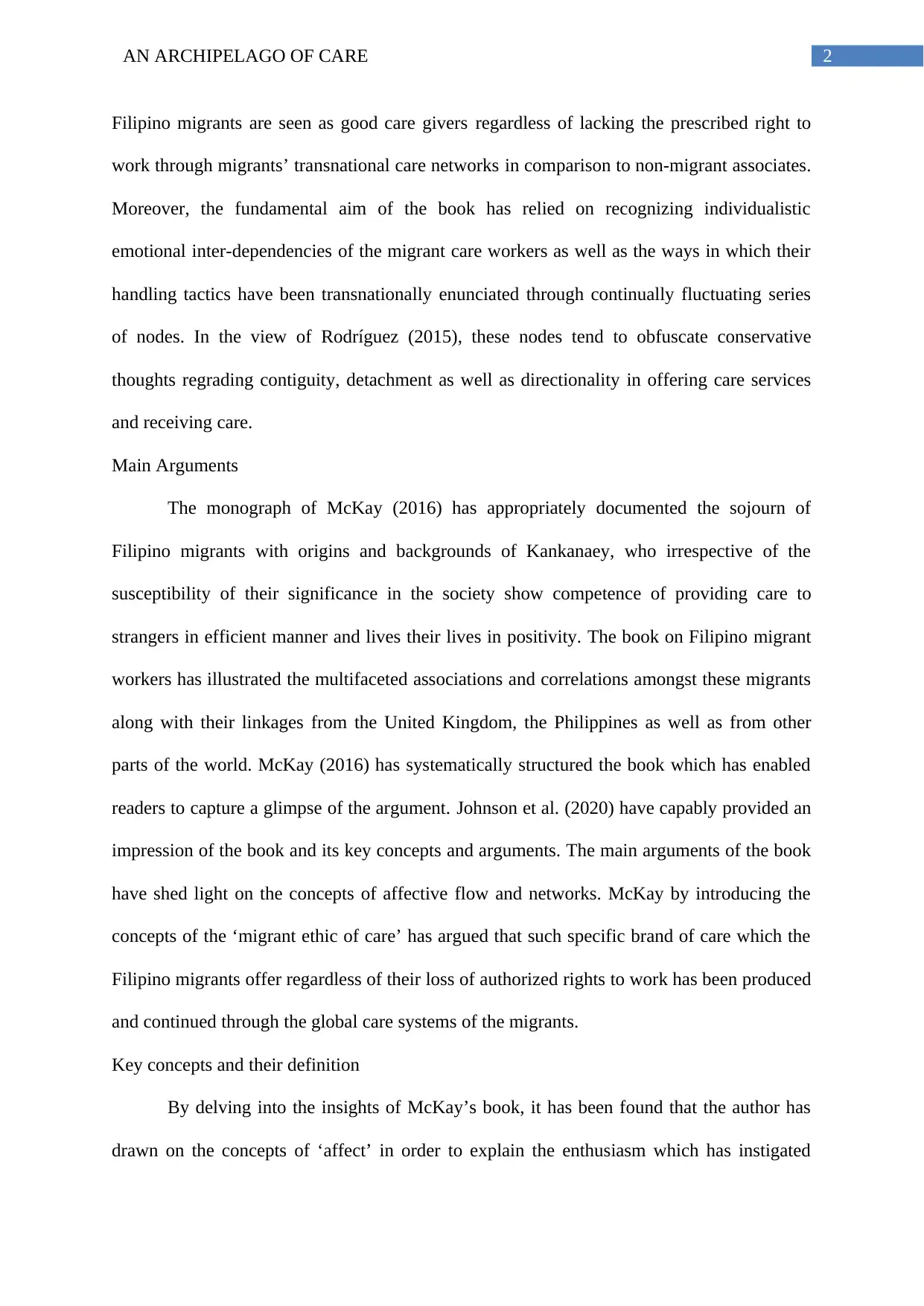
2AN ARCHIPELAGO OF CARE
Filipino migrants are seen as good care givers regardless of lacking the prescribed right to
work through migrants’ transnational care networks in comparison to non-migrant associates.
Moreover, the fundamental aim of the book has relied on recognizing individualistic
emotional inter-dependencies of the migrant care workers as well as the ways in which their
handling tactics have been transnationally enunciated through continually fluctuating series
of nodes. In the view of Rodríguez (2015), these nodes tend to obfuscate conservative
thoughts regrading contiguity, detachment as well as directionality in offering care services
and receiving care.
Main Arguments
The monograph of McKay (2016) has appropriately documented the sojourn of
Filipino migrants with origins and backgrounds of Kankanaey, who irrespective of the
susceptibility of their significance in the society show competence of providing care to
strangers in efficient manner and lives their lives in positivity. The book on Filipino migrant
workers has illustrated the multifaceted associations and correlations amongst these migrants
along with their linkages from the United Kingdom, the Philippines as well as from other
parts of the world. McKay (2016) has systematically structured the book which has enabled
readers to capture a glimpse of the argument. Johnson et al. (2020) have capably provided an
impression of the book and its key concepts and arguments. The main arguments of the book
have shed light on the concepts of affective flow and networks. McKay by introducing the
concepts of the ‘migrant ethic of care’ has argued that such specific brand of care which the
Filipino migrants offer regardless of their loss of authorized rights to work has been produced
and continued through the global care systems of the migrants.
Key concepts and their definition
By delving into the insights of McKay’s book, it has been found that the author has
drawn on the concepts of ‘affect’ in order to explain the enthusiasm which has instigated
Filipino migrants are seen as good care givers regardless of lacking the prescribed right to
work through migrants’ transnational care networks in comparison to non-migrant associates.
Moreover, the fundamental aim of the book has relied on recognizing individualistic
emotional inter-dependencies of the migrant care workers as well as the ways in which their
handling tactics have been transnationally enunciated through continually fluctuating series
of nodes. In the view of Rodríguez (2015), these nodes tend to obfuscate conservative
thoughts regrading contiguity, detachment as well as directionality in offering care services
and receiving care.
Main Arguments
The monograph of McKay (2016) has appropriately documented the sojourn of
Filipino migrants with origins and backgrounds of Kankanaey, who irrespective of the
susceptibility of their significance in the society show competence of providing care to
strangers in efficient manner and lives their lives in positivity. The book on Filipino migrant
workers has illustrated the multifaceted associations and correlations amongst these migrants
along with their linkages from the United Kingdom, the Philippines as well as from other
parts of the world. McKay (2016) has systematically structured the book which has enabled
readers to capture a glimpse of the argument. Johnson et al. (2020) have capably provided an
impression of the book and its key concepts and arguments. The main arguments of the book
have shed light on the concepts of affective flow and networks. McKay by introducing the
concepts of the ‘migrant ethic of care’ has argued that such specific brand of care which the
Filipino migrants offer regardless of their loss of authorized rights to work has been produced
and continued through the global care systems of the migrants.
Key concepts and their definition
By delving into the insights of McKay’s book, it has been found that the author has
drawn on the concepts of ‘affect’ in order to explain the enthusiasm which has instigated
⊘ This is a preview!⊘
Do you want full access?
Subscribe today to unlock all pages.

Trusted by 1+ million students worldwide
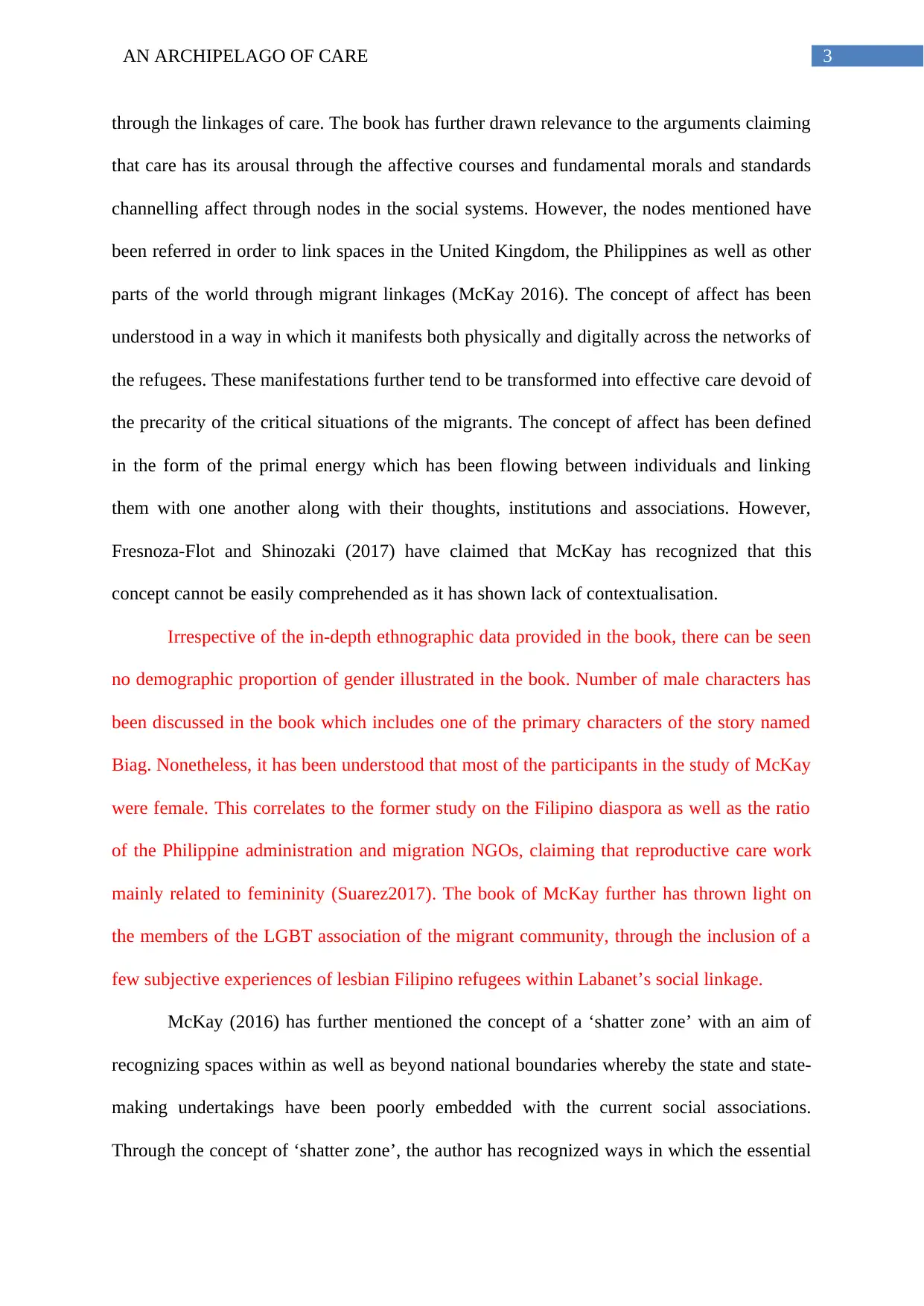
3AN ARCHIPELAGO OF CARE
through the linkages of care. The book has further drawn relevance to the arguments claiming
that care has its arousal through the affective courses and fundamental morals and standards
channelling affect through nodes in the social systems. However, the nodes mentioned have
been referred in order to link spaces in the United Kingdom, the Philippines as well as other
parts of the world through migrant linkages (McKay 2016). The concept of affect has been
understood in a way in which it manifests both physically and digitally across the networks of
the refugees. These manifestations further tend to be transformed into effective care devoid of
the precarity of the critical situations of the migrants. The concept of affect has been defined
in the form of the primal energy which has been flowing between individuals and linking
them with one another along with their thoughts, institutions and associations. However,
Fresnoza-Flot and Shinozaki (2017) have claimed that McKay has recognized that this
concept cannot be easily comprehended as it has shown lack of contextualisation.
Irrespective of the in-depth ethnographic data provided in the book, there can be seen
no demographic proportion of gender illustrated in the book. Number of male characters has
been discussed in the book which includes one of the primary characters of the story named
Biag. Nonetheless, it has been understood that most of the participants in the study of McKay
were female. This correlates to the former study on the Filipino diaspora as well as the ratio
of the Philippine administration and migration NGOs, claiming that reproductive care work
mainly related to femininity (Suarez2017). The book of McKay further has thrown light on
the members of the LGBT association of the migrant community, through the inclusion of a
few subjective experiences of lesbian Filipino refugees within Labanet’s social linkage.
McKay (2016) has further mentioned the concept of a ‘shatter zone’ with an aim of
recognizing spaces within as well as beyond national boundaries whereby the state and state-
making undertakings have been poorly embedded with the current social associations.
Through the concept of ‘shatter zone’, the author has recognized ways in which the essential
through the linkages of care. The book has further drawn relevance to the arguments claiming
that care has its arousal through the affective courses and fundamental morals and standards
channelling affect through nodes in the social systems. However, the nodes mentioned have
been referred in order to link spaces in the United Kingdom, the Philippines as well as other
parts of the world through migrant linkages (McKay 2016). The concept of affect has been
understood in a way in which it manifests both physically and digitally across the networks of
the refugees. These manifestations further tend to be transformed into effective care devoid of
the precarity of the critical situations of the migrants. The concept of affect has been defined
in the form of the primal energy which has been flowing between individuals and linking
them with one another along with their thoughts, institutions and associations. However,
Fresnoza-Flot and Shinozaki (2017) have claimed that McKay has recognized that this
concept cannot be easily comprehended as it has shown lack of contextualisation.
Irrespective of the in-depth ethnographic data provided in the book, there can be seen
no demographic proportion of gender illustrated in the book. Number of male characters has
been discussed in the book which includes one of the primary characters of the story named
Biag. Nonetheless, it has been understood that most of the participants in the study of McKay
were female. This correlates to the former study on the Filipino diaspora as well as the ratio
of the Philippine administration and migration NGOs, claiming that reproductive care work
mainly related to femininity (Suarez2017). The book of McKay further has thrown light on
the members of the LGBT association of the migrant community, through the inclusion of a
few subjective experiences of lesbian Filipino refugees within Labanet’s social linkage.
McKay (2016) has further mentioned the concept of a ‘shatter zone’ with an aim of
recognizing spaces within as well as beyond national boundaries whereby the state and state-
making undertakings have been poorly embedded with the current social associations.
Through the concept of ‘shatter zone’, the author has recognized ways in which the essential
Paraphrase This Document
Need a fresh take? Get an instant paraphrase of this document with our AI Paraphraser
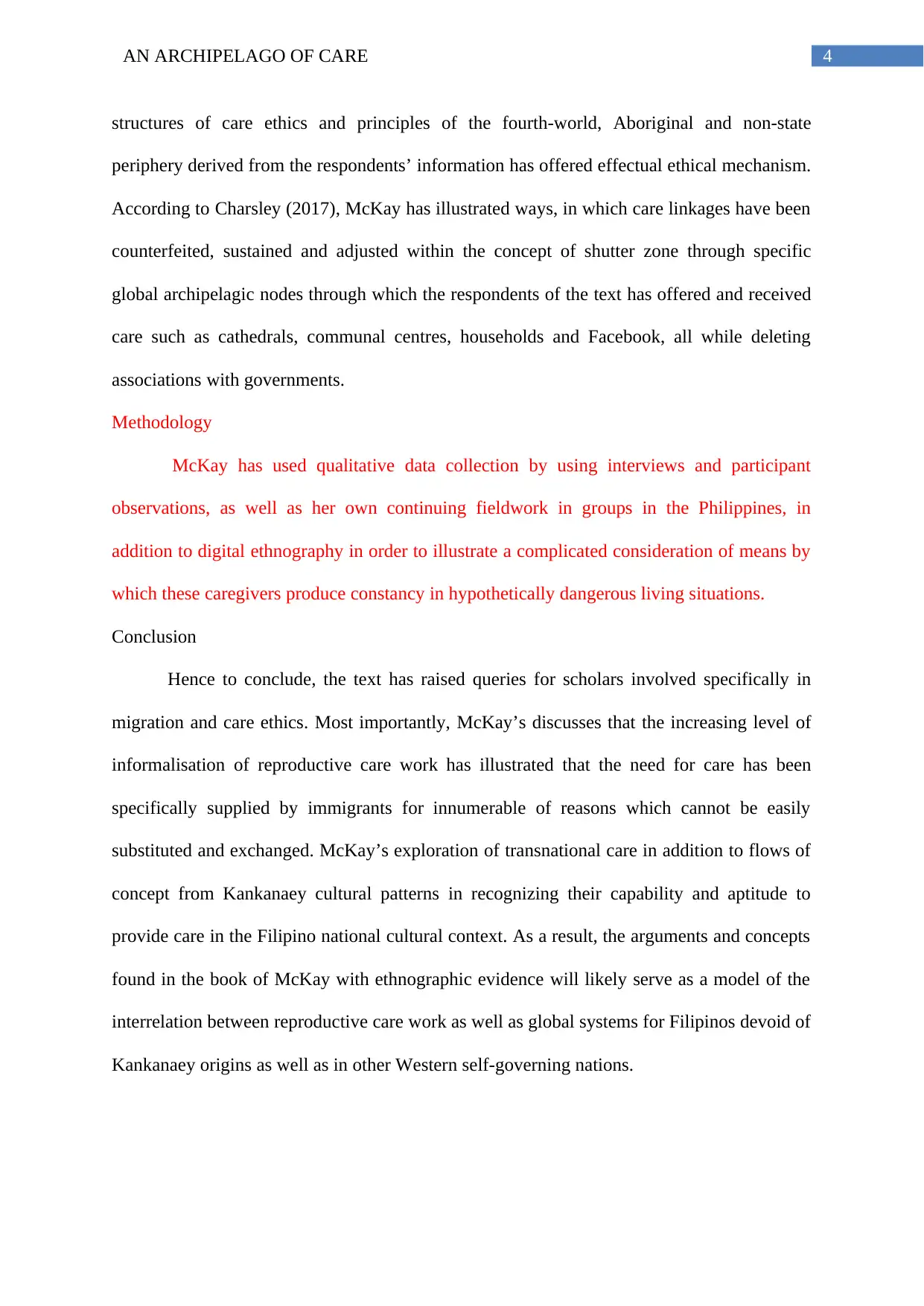
4AN ARCHIPELAGO OF CARE
structures of care ethics and principles of the fourth-world, Aboriginal and non-state
periphery derived from the respondents’ information has offered effectual ethical mechanism.
According to Charsley (2017), McKay has illustrated ways, in which care linkages have been
counterfeited, sustained and adjusted within the concept of shutter zone through specific
global archipelagic nodes through which the respondents of the text has offered and received
care such as cathedrals, communal centres, households and Facebook, all while deleting
associations with governments.
Methodology
McKay has used qualitative data collection by using interviews and participant
observations, as well as her own continuing fieldwork in groups in the Philippines, in
addition to digital ethnography in order to illustrate a complicated consideration of means by
which these caregivers produce constancy in hypothetically dangerous living situations.
Conclusion
Hence to conclude, the text has raised queries for scholars involved specifically in
migration and care ethics. Most importantly, McKay’s discusses that the increasing level of
informalisation of reproductive care work has illustrated that the need for care has been
specifically supplied by immigrants for innumerable of reasons which cannot be easily
substituted and exchanged. McKay’s exploration of transnational care in addition to flows of
concept from Kankanaey cultural patterns in recognizing their capability and aptitude to
provide care in the Filipino national cultural context. As a result, the arguments and concepts
found in the book of McKay with ethnographic evidence will likely serve as a model of the
interrelation between reproductive care work as well as global systems for Filipinos devoid of
Kankanaey origins as well as in other Western self-governing nations.
structures of care ethics and principles of the fourth-world, Aboriginal and non-state
periphery derived from the respondents’ information has offered effectual ethical mechanism.
According to Charsley (2017), McKay has illustrated ways, in which care linkages have been
counterfeited, sustained and adjusted within the concept of shutter zone through specific
global archipelagic nodes through which the respondents of the text has offered and received
care such as cathedrals, communal centres, households and Facebook, all while deleting
associations with governments.
Methodology
McKay has used qualitative data collection by using interviews and participant
observations, as well as her own continuing fieldwork in groups in the Philippines, in
addition to digital ethnography in order to illustrate a complicated consideration of means by
which these caregivers produce constancy in hypothetically dangerous living situations.
Conclusion
Hence to conclude, the text has raised queries for scholars involved specifically in
migration and care ethics. Most importantly, McKay’s discusses that the increasing level of
informalisation of reproductive care work has illustrated that the need for care has been
specifically supplied by immigrants for innumerable of reasons which cannot be easily
substituted and exchanged. McKay’s exploration of transnational care in addition to flows of
concept from Kankanaey cultural patterns in recognizing their capability and aptitude to
provide care in the Filipino national cultural context. As a result, the arguments and concepts
found in the book of McKay with ethnographic evidence will likely serve as a model of the
interrelation between reproductive care work as well as global systems for Filipinos devoid of
Kankanaey origins as well as in other Western self-governing nations.
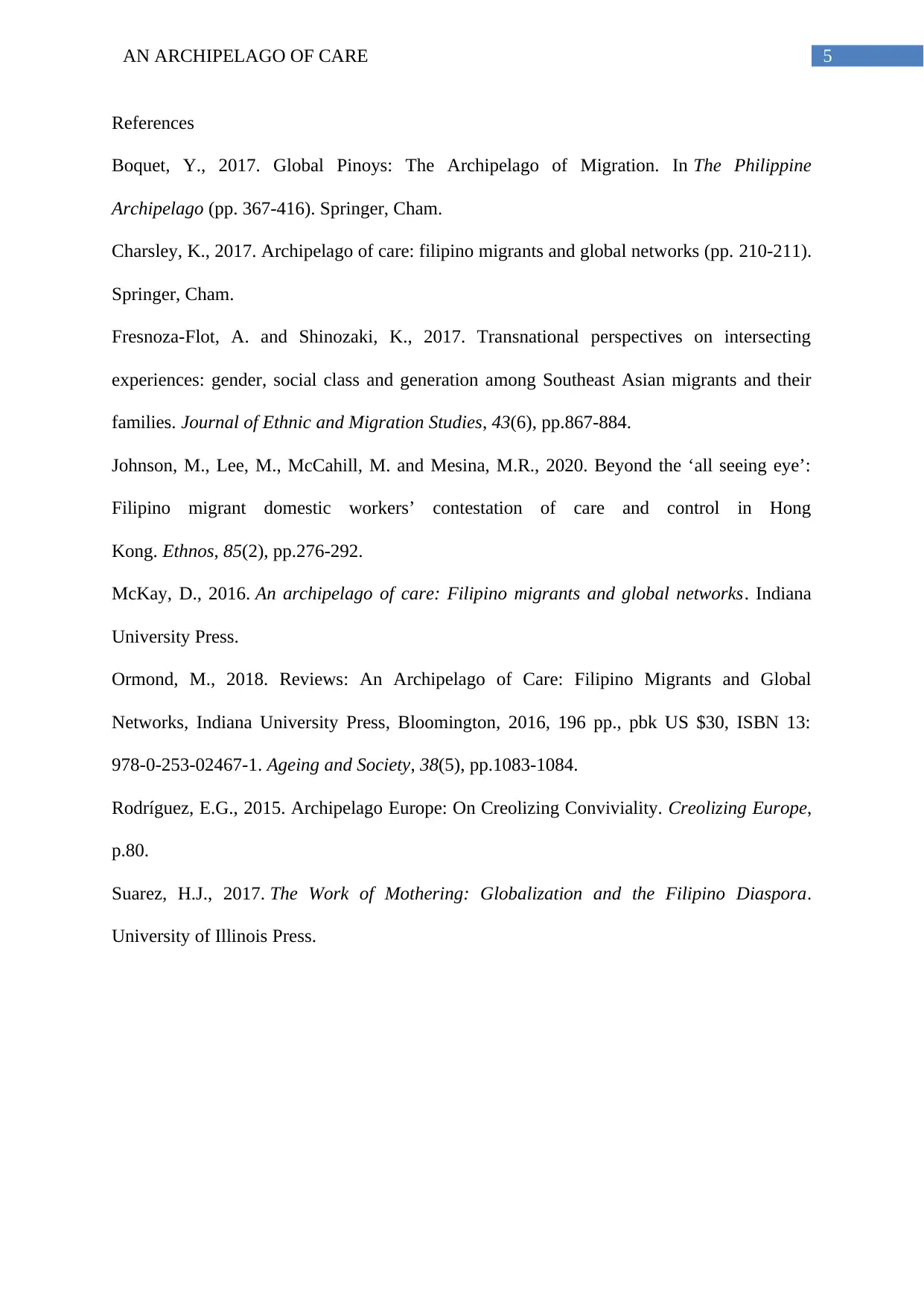
5AN ARCHIPELAGO OF CARE
References
Boquet, Y., 2017. Global Pinoys: The Archipelago of Migration. In The Philippine
Archipelago (pp. 367-416). Springer, Cham.
Charsley, K., 2017. Archipelago of care: filipino migrants and global networks (pp. 210-211).
Springer, Cham.
Fresnoza-Flot, A. and Shinozaki, K., 2017. Transnational perspectives on intersecting
experiences: gender, social class and generation among Southeast Asian migrants and their
families. Journal of Ethnic and Migration Studies, 43(6), pp.867-884.
Johnson, M., Lee, M., McCahill, M. and Mesina, M.R., 2020. Beyond the ‘all seeing eye’:
Filipino migrant domestic workers’ contestation of care and control in Hong
Kong. Ethnos, 85(2), pp.276-292.
McKay, D., 2016. An archipelago of care: Filipino migrants and global networks. Indiana
University Press.
Ormond, M., 2018. Reviews: An Archipelago of Care: Filipino Migrants and Global
Networks, Indiana University Press, Bloomington, 2016, 196 pp., pbk US $30, ISBN 13:
978-0-253-02467-1. Ageing and Society, 38(5), pp.1083-1084.
Rodríguez, E.G., 2015. Archipelago Europe: On Creolizing Conviviality. Creolizing Europe,
p.80.
Suarez, H.J., 2017. The Work of Mothering: Globalization and the Filipino Diaspora.
University of Illinois Press.
References
Boquet, Y., 2017. Global Pinoys: The Archipelago of Migration. In The Philippine
Archipelago (pp. 367-416). Springer, Cham.
Charsley, K., 2017. Archipelago of care: filipino migrants and global networks (pp. 210-211).
Springer, Cham.
Fresnoza-Flot, A. and Shinozaki, K., 2017. Transnational perspectives on intersecting
experiences: gender, social class and generation among Southeast Asian migrants and their
families. Journal of Ethnic and Migration Studies, 43(6), pp.867-884.
Johnson, M., Lee, M., McCahill, M. and Mesina, M.R., 2020. Beyond the ‘all seeing eye’:
Filipino migrant domestic workers’ contestation of care and control in Hong
Kong. Ethnos, 85(2), pp.276-292.
McKay, D., 2016. An archipelago of care: Filipino migrants and global networks. Indiana
University Press.
Ormond, M., 2018. Reviews: An Archipelago of Care: Filipino Migrants and Global
Networks, Indiana University Press, Bloomington, 2016, 196 pp., pbk US $30, ISBN 13:
978-0-253-02467-1. Ageing and Society, 38(5), pp.1083-1084.
Rodríguez, E.G., 2015. Archipelago Europe: On Creolizing Conviviality. Creolizing Europe,
p.80.
Suarez, H.J., 2017. The Work of Mothering: Globalization and the Filipino Diaspora.
University of Illinois Press.
⊘ This is a preview!⊘
Do you want full access?
Subscribe today to unlock all pages.

Trusted by 1+ million students worldwide
1 out of 6
Your All-in-One AI-Powered Toolkit for Academic Success.
+13062052269
info@desklib.com
Available 24*7 on WhatsApp / Email
![[object Object]](/_next/static/media/star-bottom.7253800d.svg)
Unlock your academic potential
Copyright © 2020–2025 A2Z Services. All Rights Reserved. Developed and managed by ZUCOL.